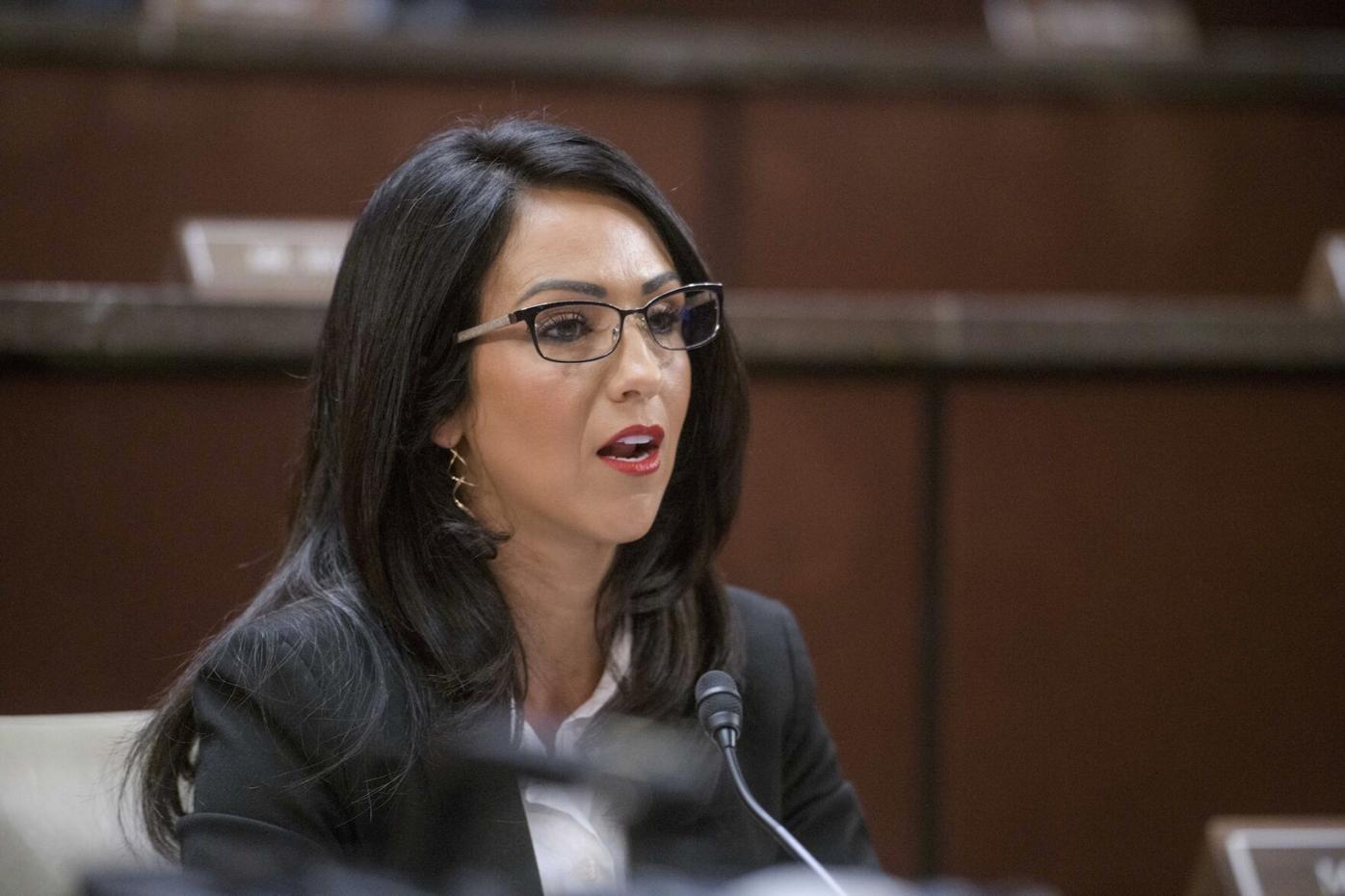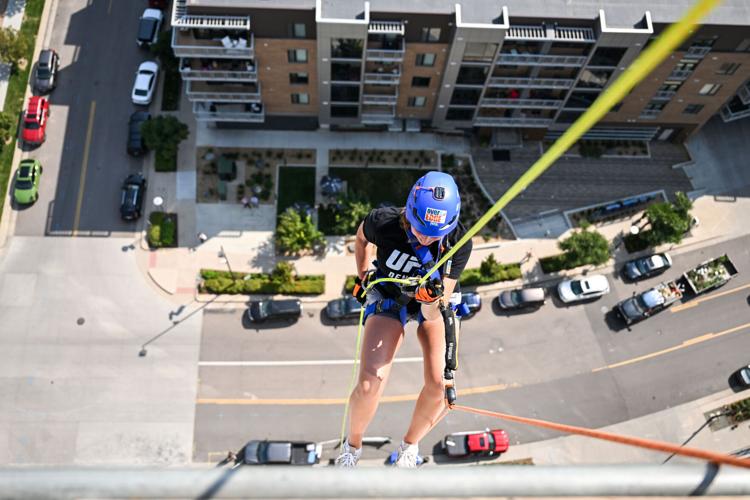Lauren Boebert, GOP colleagues grill Denver Mayor Mike Johnston on ‘sanctuary’ policies
None of the Republican members of Congress from Colorado threatened Denver Mayor Mike Johnston with arrest or accused the Democrat of committing treason, but U.S. Rep. Lauren Boebert and her three Republican colleagues held Johnston’s feet to the fire Wednesday during House committee hearing on “sanctuary” cities.
Boebert, a third-term lawmaker from Windsor and a member of the House Committee on Oversight and Government Reform, led off questioning shortly after the nearly six-hour hearing commenced.
The state’s other GOP representatives — freshmen U.S. Reps. Jeff Hurd, Jeff Crank and Gabe Evans — aren’t members but asked to “waive on” to the 47-member panel for the day. They took the microphone hours after Boebert, near the marathon session’s conclusion.
Johnston appeared with New York Mayor Eric Adams, Chicago Mayor Brandon Johnson and Boston Mayor Michelle Wu to answer questions about how their cities have handled a flood of tens of thousands of immigrants from the southern border in recent years.
“Thanks to the Trump administration’s policies, the border is CLOSED to all illegal aliens!” Boebert tweeted the day before Johnston’s appearance, quoting her own remarks at another committee hearing. “However, Colorado’s Sanctuary State policies prevent ICE from being able to do their job and remove criminal aliens from our streets!”
Evans, an Army veteran and former Arvada police officer, said before the hearing that he intended to “highlight how these sanctuary city and state policies fail public safety, make America less safe, and why we need to continue the path forward to build safe communities that we all deserve.”
“As a police officer for over a decade in the metro area,” Evans added, “I saw firsthand what was contributing to these problems, and a significant percentage of the blame lays on sanctuary city and state policies that allow violent transnational criminal organizations and cartels to come into our community and find safe harbor.”
Republicans on the committee took the opportunity to grill the mayors over how their police departments interact with federal immigration authorities, while the panel’s Democrats mainly criticized the Trump administration’s deportation policies or gave the witnesses a chance to extoll how successfully they’ve met their challenges.
Several GOP committee members from other states said the mayors had violated the law by refusing to work seamlessly with immigration authorities. U.S. Rep. James Palmer of Alabama said he would recommend that the mayors face obstruction of justice charges, and U.S. Rep. Anna Paulina Luna of Florida produced documents she said were criminal referrals to the Justice Department.
After asking the mayors a series of questions about their cities’ record of cooperation with federal immigration officials, U.S. Rep. Marjorie Taylor Greene of Georgia declared that they had given “aid and comfort to the enemies of the United States,” amounting to “an act of treason,” a capital crime punishable by death.
None of the Coloradans went that far, but Boebert, Evans, and Crank aggressively grilled Denver’s mayor about different aspects of the city’s immigration policy.
Hurd’s less confrontational questioning allowed Johnston to boast about the city’s approach and yielded some news, that the city’s spending on immigrants had fallen to just 10% of its levels last year.
In her allotted five minutes to question the mayors, Boebert pressed Johnston over a state law that limits local governments’ coordination with federal immigration authorities. At one point, she asked whether Johnston would demand that the law be repealed, but he declined.
“We do coordinate with ICE,” Johnston said, referring to U.S. Immigration and Customs Enforcement. He added that the city hands over detainees when immigration officers provide a warrant, as the law requires, but that didn’t satisfy Boebert, who wanted to know if the city works with the feds before a warrant had been issued.
She also asked the mayor about a Denver ordinance that prohibits city staff from coordinating with immigration enforcement. She noted that Denver employees could be fired for talking to ICE but weren’t prohibited from communicating with other federal agencies, such as the Environmental Protection Agency or Health and Human Services.
“Right now, congresswoman, we don’t ask people’s status,” Johnston said.
Boebert concluded by taking a shot at the $2 million contract the city signed to pay “Joe Biden’s former lawyer to cover your a**” at this hearing, but Johnston noted that Denver’s city council had approved a contract up to that amount for legal advice that could extend well into the future.
Evans asked Johnston about the city’s public safety record and whether officials kept track of criminals’ immigration statuses after reeling off a string of statistics that depicts Denver as significantly less safe than other major U.S. cities.
The lawmaker then asked Johnston if he knew how many murders in the city were committed by people who weren’t legally present in the country.
Johnston disputed Evans’ characterization of the city’s crime rate, insisting that crime was dropping dramatically since a post-pandemic high, but acknowledged that Denver doesn’t keep track of immigration status when its officers interact with accused criminals.
“We don’t ask anyone’s status at point of arrest,” Johnston said. “We do not know someone’s status when they’re charged.”
Anticipating that answer, Evans bore in as an aide displayed an enlarged Denver Police Department training bulletin, followed by the standard FBI fingerprint form, which includes spaces for a suspect’s country of origin and citizenship status.
Johnston responded that the city didn’t intend to change its procedures.
“Right now, under city ordinance, we do not ask someone’s status at point of contact, and that does not prejudice in any way our prosecution,” he said. “We believe it doesn’t matter.”
In one exchange, Crank told Johnston that the city’s policies governing how detainees are transferred from the city jail to federal custody endanger law enforcement personnel and called on Johnston to change the procedures.
“In rare cases where ICE is able to apprehend an illegal immigrant in Denver jails, Denver forbids that transfer from taking place in the jail,” Crank said. He added that he recently completed a ride along with sheriff’s deputies in El Paso County, where transfers to ICE take place in the jail, with local officers present and the detainee in handcuffs the entire time.
Added Crank: “Let’s just be honest, with no Denver Police Department officer there to assist if the situation turns violent, that’s irresponsible.”
Crank cited a recent incident when an alleged Tren de Aragua gang member was transferred from Denver’s custody to immigration officials in a parking lot outside a Denver jail, which resulted in the suspect biting an ICE officer.
Johnston said that out of more than 1,200 transfers to ICE, that was the first that resulted in violence and an injury, leading Crank to ask if the mayor had apologized to the ICE officer who was assaulted during the transfer.
“I reached out to the ICE officers yesterday, and I’ve asked to sit down with them to talk about this procedure and how we can align systems to make sure no other officers get injured,” Johnston said.
In a more collegial exchange, Hurd asked Johnston if he thought Denver could be “reaching a breaking point” soon, but Johnston said the city was in much better shape than it was last year.
“We actually are seeing dramatic drops in the arrivals since June of 2024, so we are not in a moment of crisis right now,” Johnston said. “We don’t have migrant encampments. We’ve closed all of our shelters. We’ve actually dropped our spending on migrant supports by 90% from 2024 to 2025, so our expenditures are down dramatically, and we’d love to see it stay that way.”







